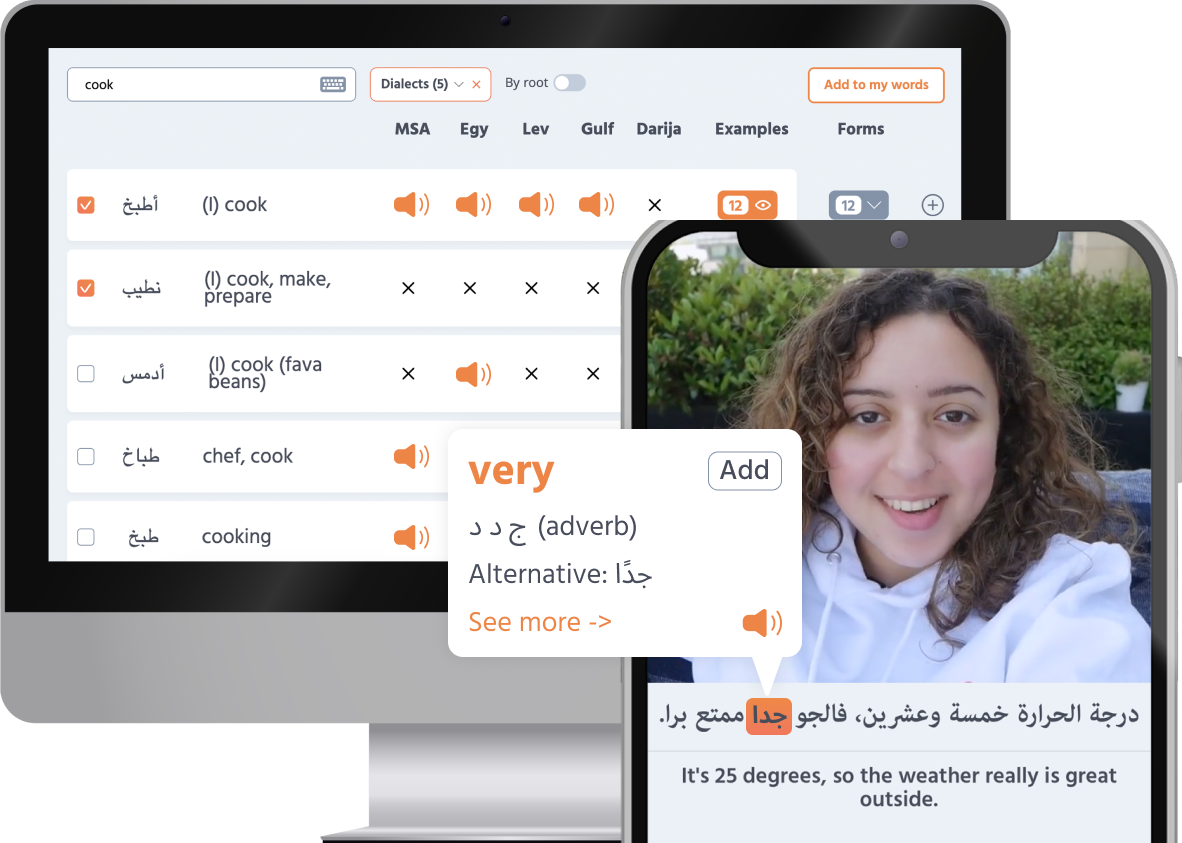There are some phrases that can help you kick off your Levantine Arabic day in the right tone, and today, we’re going to look at some of those phrases to help you greet people properly.
Mornings are vibrant and full of life, and I’m not just talking about the jolt from your قهوة
(coffee). We’ve got what you need in this blog to cover your morning hellos to get your Levantine Arabic day off to a great start.
How to say “ good morning“ in Levantine Arabic The most common way to greet someone in the morning throughout the Arab World, including the Levant, is by saying !صباح الخير
It translates to “morning of goodness,” and it’s pretty much the same as saying “good morning” in English.
People usually use this greeting from the early morning until around 12pm. The response is usually صباح النور
, which literally means “morning of light.”
From Tababa , a Jordanian series.
Get free Arabic videos with interactive captions for your level
Get free videos
Nine more morning greetings in Levantine Arabic While صباح الخير
is a solid and universal choice, having a few more morning greetings up your sleeve can give you more choices. So, let me offer you some alternatives for different situations and levels of formality:
صباحو
(casual) صباحو
means “Good morning,” and it is informal, used among friends, and considered a kind of cheerful greeting.
For example:
صباحو يا حلو
*Note that حلو
can refer to either a male or a female in Levantine romantic expressions.
بتمنالك صباح حلو
(casual) بتمنالك صباح حلو
(for addressing a male), بتمنالك صباح حلو
(for addressing a female), literally means: I wish you a sweet morning.
For example:
شكراً عالمساعدة، بتمنالَك صباح حلو
يسعد صباحك
(casual/formal) يسعد صباحك
(for addressing a male), يسعد صباحك
(for addressing a female), literally means “Have a good (rest of the) morning!” and is simply used to mean “Good morning.” It is informal, though there is no issue using it with strangers; it comes across as more friendly than formal.
صباحك سعيد
(casual/formal) صباحك سعيد
(for addressing a male), صباحك سعيد
(for addressing a female), and صباحكن سعيد
(for addressing a group) are popular morning greetings in Arabic, equivalent to saying “Good morning.” Literally translating to “I wish you a happy morning,” this phrase is widely used in both formal and informal settings, conveying warmth and positivity at the start of the day.
نمت منيح؟
(casual) نمت منيح؟
(for addressing a male), نمتي منيح؟
(for addressing a female), means “Did you sleep well?”
Of course, you wouldn’t ask your boss this question. It is commonly used among loved ones, family members, and friends to check if their morning is going well after a good night’s sleep.
For example:
صباح الخير، حبيبي. نمت منيح؟
أهلين
(casual) أهلين
means “hello” or “welcome.” It is informal, especially when used to initiate a greeting with أهلين
and not as a response to the word مرحبا
.
For example:
أهلين حبيبي، شو أخبارك؟
Or if you’re addressing a female: أهلين حبيبتي، شو أخبارك؟
*Note that أهلين
is not restricted to mornings only, it can be virtually used at all times!
From a Syrian clip .مرحبا
(casual/formal) مرحبا
means “Hello,” and this greeting can be used at all times and in all situations, so it is also suitable as a morning greeting.
For example:
مرحبا، ممكن كابتشينو بعد إذنك؟
From Alwan, a Lebanese TV show for children. صبحتك
(casual) In Lebanese Arabic, صبحتك
is used to directly wish a good morning to a male, صبحتك
when addressing a female, and صبحتكن
when addressing a group. The variations reflect the different pronoun endings: -ak for masculine singular, -ik for feminine singular, and -kon for plural. This nuanced use of pronouns adds a personal touch to the morning greeting, making it contextually appropriate and culturally rich.
شمستك عالية
(casual) شمستك عالية
(or شمسك عالية
) for addressing a male and شمستك عالية
(or شمسك عالية
) for addressing a female is a common Syrian expression used to describe someone who has woken up late. It literally means “Your sun is high,” humorously implying that the sun is already high in the sky by the time they woke up. This informal phrase is typically used among relatives and friends.
For example:
!هلأ فايق؟ شمستك عالية
(Just waking up now? Your sun’s high!)
So, whether you’re a morning person or not, starting your day with one of those phrases will boost your morning by getting you a smile from your Levantine friend! Your choice of words can add flavor to your greeting. And as you have learned by now, your good morning greeting can be a wish for happiness and not just one of those cliche dull greetings.
Looking to continue the conversation further? Then check out “Ten Ways to Say ‘How Are You? in Levantine Arabic .”
Oh, and by the way… If learning Levantine Arabic at your own pace, with fun, real-world videos sounds like your style, then Playaling could be exactly what you’re looking for!
With Playaling, you’ll dive into Arabic just as it’s spoken in Lebanon, Syria, Jordan and Palestine. Our diverse range of videos has it all—from everyday conversations and cultural moments to music videos, TV and movie clips, influencer content, news broadcasts, and inspiring talks.
Our interactive captions let you tap any word for instant translations, context, and audio. So, real Levantine content becomes accessible with just a click. Miss something? No problem—rewind and listen as often as you need, or hover over subtitles for quick definitions.
Spot a word you want to learn? Save it to your personalized word set, or dive into curated sets for focused practice and easy review.
Interactive exercises let you dive in and practice what you’ve learned.
Need to look something up? The Audio Dictionary has you covered with clear human pronunciations and real world examples.
It’s a learning experience that keeps you engaged, bringing authentic, real-world Arabic closer to you every step of the way.
Give it a try!









